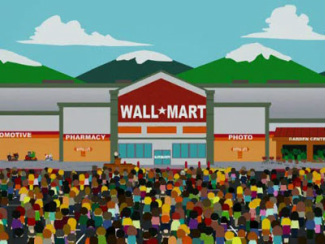 Kyle and Stan attempt to destroy the heart of Wall-Mart Kyle and Stan attempt to destroy the heart of Wall-Mart
Tags: capitalism, commodification, consumption/consumerism, corporations, economic sociology, marketing/brands, marx/marxism, political economy, theory, culture industry, false needs, max horkheimer, theodor adorno, wal-mart, 00 to 05 mins
Year: 2004 Length: 3:48 Access: South Park Studios Summary: In this South Park clip, Kyle and Stan enter the local Wall-Mart in an attempt to ruin the business because the people of South Park have been negatively affected by its recent opening in their town. Having been led to believe that destroying the “heart” will destroy the business, the boys search the store for the “heart” of Wal-Mart . While Randy (Stan's father) is walking through the store with the boys, he is distracted by the fact that Wal-Mart continues to lower their prices. Everywhere he looks there are items that he does not need, but he continues to buy them because of the low prices. In this way, Wal-Mart is creating “false-needs,” which are created and fulfilled by capitalism, and exert power over Randy. When the boys meet the man that calls himself “Wal-Mart,” he claims that he can take any “form” that he chooses. He then switches clothes, thereby acquiring different forms through consumer goods, and asks the boys which “form” they prefer. When the boys find the “heart,” they are surprised to see that it is a mirror; i.e. the “heart” of Wal-Mart is the consumer. The man adds that his “forms” can be Wal-Mart, K-Mart, and Target, but that he represents one single entity, “desire.” This desire is the power that is exerted over people by major corporations. While the clip seems to suggest that Wal-Mart is simply fulfilling the desires of the consumer, viewers may consider how such desire and the low prices of Wal-Mart are produced more broadly. Through advertising and Wal-Mart's artificially low prices (e.g. by exploiting cheap labor), these desires are produced like a commodity in a factory and are a fundamental mechanism for capitalist control over people. By suggesting that the "heart of Wal-Mart" is the consumer, does it offer hope in us being able to change the corporate giant or does it unfairly place blame on individuals for a bigger structural issue? Submitted By: Sean Kelley and Ian Hammer
2 Comments
Manuel Franco
7/30/2023 11:54:58 am
I just want to say Thank You to everyone who supported me through the years. My name is Manuel Franco, New Berlin, Wisconsin. My story of how I won the Powerball lottery of $768.4M is a bit of a tale. I have been playing Powerball tickets for 6 years now since I turned 18. I bought my first ticket on my 18 birthday. I was feeling very lucky that day because I had contacted Dr. Odunga Michael to help me with the winning Powerball numbers. I really had that great great feeling that I looked at the camera wanting to wink at it. I only did a tiny part of it and trusted him. He gave me the numbers after I played a couple other tickets along with it for $10. I checked my ticket after the winnings came online and saw the numbers were correct including the Power play. I screamed for about 10 minutes because it felt like a dream. I had won $768.4M. You can check my winning testimony with the lottery officials just with my name search. Thank you Dr Odunga. Well, his email is [email protected] and you can also call or Whats-app him at +2348167159012 so you guys can contact him
Reply
mark hold
7/8/2024 08:06:22 am
Herbal Penis Enlargement product is 100% guaranteed to Enlarge and get a better ERECTION, the reason why most people are finding it difficult to enlarge Penis is that they believe in medical reports, drugs and medical treatment which is not helpful for Penis Enlargement. Natural roots/herbs are the best remedies which can easily Enlarge your Penis permanently Contact Dr MOSES BUBA via Email: [email protected] or via WhatsApp: +2349060529305. for Natural root and herbal remedies put together to help Enlarge manhood and Erect healthily. I also learn that Dr MOSES BUBA also can cure other types of diseases, HEPATITIS B,DIABETICS,CANCER,HPV,LOW SPERM CAM, HIV/STDS, FIBROSIS LOST OF WEIGHT, BREAST ENLARGEMENT, HIPS and BUMS ENLARGEMENT etc .
Reply
Leave a Reply. |
Tags
All
.
Got any videos?
Are you finding useful videos for your classes? Do you have good videos you use in your own classes? Please consider submitting your videos here and helping us build our database!
|
 RSS Feed
RSS Feed
